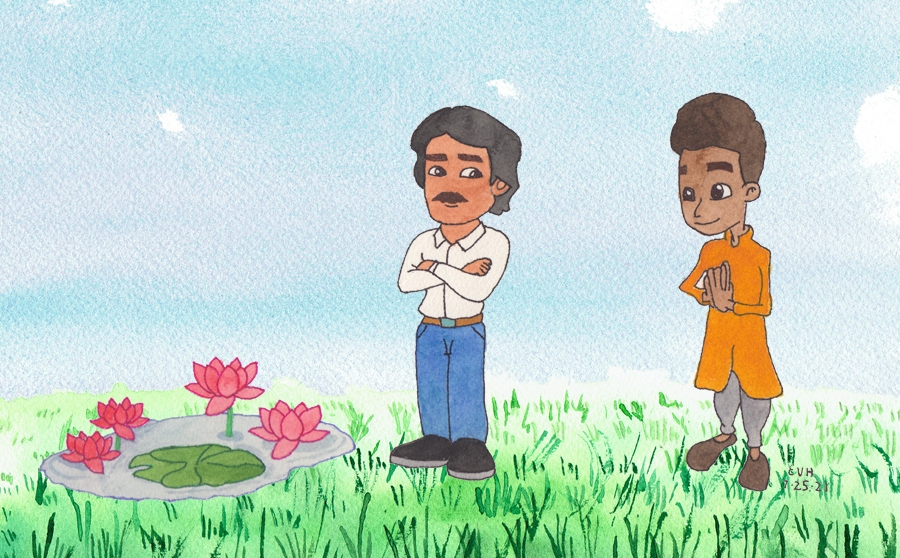
Jataka 261
Paduma Jātaka
The Lotus Story
as told by Eric Van Horn
originally translated by William Henry Denham Rouse, Cambridge University
originally edited by Professor Edward Byles Cowell, Cambridge University
This is a simple story that is an homage to Ānanda and the virtue of speaking the truth.
Even though Ānanda was “only” a stream-enterer during the Buddha’s life, the Buddha often praised him for his virtue and his good qualities. And here the Buddha praises honesty, both in Ānanda and himself in a previous lifetime.
“Cut and cut and cut again.” The Master told this story at Jetavana. It is about some monks who made offering of garlands under Ānanda’s tree. The circumstances will be given in the Kāliṅga-bodhi Birth (Jātaka 479). This was called Ānanda’s tree because Ānanda planted it. All India heard tell how the Elder had planted this tree by the gate of Jetavana.
Some monks who lived in the country thought they would make offerings before Ānanda’s tree. They journeyed to Jetavana where they paid their respects to the Master. On the next day they went to Sāvatthi to the Lotus Street, but they were unable to find any garlands. So they told Ānanda that they had wanted to make an offering to the tree, but that not a garland was to be had on all Lotus Street. The Elder promised to find some. So he went off to the Lotus Street and returned with many handfuls of blue lotus which he gave to them. With these they made their offering to the tree.
When the monks heard about this, they began discussing the Elder’s merits in the Dharma Hall. “Friend, some brothers of little merit from the country could not get a single bunch of flowers in the Lotus Bazaar, but the Elder went and found them some.” The Master entered and asked what they were discussing as they sat there. They told him. He said he, “Monks, this is not the first time that the clever tongue has gained a garland for clever speaking. It was the same before.” And he told them this story from the past.
Once upon a time, when Brahmadatta reigned in Benares, the Bodhisatta was a rich merchant’s son. In the town was a water pond in which the lotus blossomed. A man who had lost his nose looked after the pond.
It happened one day that they proclaimed holiday in Benares. The three sons of this rich man thought that they would put decorate themselves with wreaths and go a merrymaking. “We’ll flatter the old noseless fellow, and then we’ll beg some flowers from him.” So at the time when he usually picked the lotus flowers, they went to the pond and waited. And one of them uttered the first stanza:
“Cut and cut and cut again,
Hair and whiskers grow amain,
And your nose will grow like these,
Give me just one lotus, please!”
But the man became angry and would not give them any flowers. Then the second son said the second stanza:
“In the autumn seeds are sown
Which when long are fully grown.
May your nose sprout up like these.
Give me just one lotus, please!”
Again the man was angry and he gave them no lotuses. Then the third son repeated the third stanza:
“Babbling fools! To think that they
Can get a lotus in this way.
Say they yes, or say they no,
Noses cut no more will grow.
See, I ask you honestly,
Give a lotus, air, to me!”

Figure: The power of honesty
On hearing this the pond keeper said, “The other two lied, but you have spoken the truth. You deserve to have some lotuses.” So he gave him a great bunch of lotuses, and he went back to his pond.
When the Master ended this discourse, he identified the birth: “I was the boy who got the lotus.”
